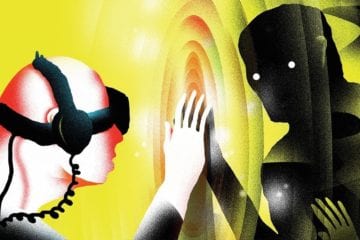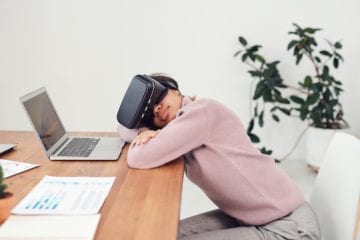Mental health is a global crisis. In the United States alone, 46.4% of people will struggle with poor mental health (including anxiety, depression, and stress) during their lifetime.
Early signs of poor mental health can include poor concentration, fatigue, becoming easily distracted, and feeling overwhelmed.
While there are many forms of solutions for wellness prevention, the latest remedies include a wide range of natural and technological options. These provide an alternative to prescription drugs and traditional therapy, which some people prefer not to pursue due to the cost, accessibility, and potential side effects.
The latest solutions for wellness prevention
The innovative solutions helping people to feel happier and healthier provide an array of experiences to assist in altering mood and changing behavior. The following are the latest methods transforming the world of mental health.
1. AI Chatbots to Manage Mental Health
Artificial intelligence in mental health care is a growing trend. Chatbots, in particular, provide patients with mental health management. The main benefit for patients is that chatbots provide quick and anonymous access to a mental health professional.
An app, such as Woebot, enables users to connect with a ‘robot’ which provides quick conversions and daily check-ins to aid mood improvement. Another app called Pacifica provides cognitive behavioral therapy to enhance mood.
For people who struggle to leave their home, or require immediate access to mental health management, an AI chatbot is an invaluable tool. No matter where a person is located or whether it’s late at night, users don’t have to wait for an appointment to speak to someone about their mental health.
2. ASMR for Relaxation
Also known as autonomous sensory meridian response, ASMR is a relaxing experience that triggers a tingling sensation that moves down the body. ASMR is often characterized by repeated sights and sounds, such as whispering, tapping, and brushing.
Many people find that ASMR helps them to keep calm and relieves insomnia, with one study demonstrating that ASMR improves mood. There’s no scientific explanation as to why some people feel the sensation associated with ASMR and others don’t. Although, one study suggested that personality traits play a part.
Thanks to the popularity of YouTube, there are over 15 million ASMR videos available, allowing users to experience this form of wellness prevention for free.
3. CBD Has Been Shown To Treat Anxiety and Insomnia
Cannabidiol (CBD) is a chemical compound found in cannabis. Unlike the ‘high’ that using cannabis produces, CBD is not psychoactive and is said to provide relief from physical pain, such as arthritis.
CBD products have exploded into the market in recent years due to their noted range of health benefits for a wide variety of people. In one study, a 300mg dose of CBD significantly reduced anxiety, while another study found that CBD oil treated anxiety and insomnia in children with PTSD.
As CBD is a natural remedy, many prefer it to taking prescription drugs. Side effects of CBD appear to be minimal, although some have reported dry mouth, drowsiness, and low blood pressure.
4. Meditation Apps for Mindfulness
Meditation and mindfulness apps guide users through specific meditations, helping them to focus on the present. Many meditation apps offer extra features, including sleep stories and calming background sounds.
Meditation apps like Headspace and Calm promote good health and well-being by helping to relieve stress and anxiety. One study on Headspace found that subjects completing ten introductory sessions felt more positive in comparison to subjects using an audiobook with no guided practice.
A study of the Calm app reported reduced feelings of stress and improved self-compassion in stressed college students. Additionally, meditation apps have demonstrated effectiveness in improving attention span in young adults.
Meditation apps can be used by both beginners and more advanced mindfulness users. Positive effects of these apps have been noted after just 10 to 20 minutes of usage per day, helping users to be more focused, happier, and less stressed. One study found that beneficial effects can last up to four months, suggesting that long-term improvements may be possible.
As there are several meditation apps available, meditation is more accessible for users. Additionally, it’s highly convenient, providing on-the-go mindfulness from a mobile phone, whether users are at home or traveling.
5. Online Therapy for Convenient Access to A Medical Professional
Online therapy allows people to access a clinical psychologist or counselor via webcam, phone or email. This type of wellness prevention provides digital communication, so patients have better access to a medical professional. For example, it saves those living in rural areas from having to commute to see a face-to-face therapist.
Platforms like Mynurva and Talkspace provide confidential and fast access to a qualified online therapist. Users don’t have to deal with the waiting lists that traditional therapists may have, and the convenience of talking with a therapist in your own home is highly beneficial for many.
Studies have suggested that online therapy can be as effective as traditional in-person therapy. However, one study found that those experiencing positive online therapy may then seek out a higher level of care if needed.
6. Virtual Reality for Transformational Change
Virtual reality experiences can help everyday people manage their mental health. While access to virtual therapy has been limited due to cost and technology, the growth of affordable VR experiences has allowed more people to take advantage.
Various forms of VR treatments have entered the medical field with amazing results. VR has been shown to improve feelings of anxiety, PTSD, and ease specific phobias. Some forms of VR therapy gradually expose patients to ‘uncomfortable’ settings which induce anxiety or stress. This immersive solution builds up a patient’s confidence, allowing them to tackle a digital setting before experiencing the real thing.
Is it effective? A social anxiety study found VR therapy was effective both post-treatment and after a period of six months.
Helping people feel happier and healthier
New solutions for improving your mental health are constantly emerging, offering people better access, affordability, and affective experiences.
Presence utilizes virtual reality and neuroscience to allow the user to enter their own mind. This immersive experience allows for deep change through self-awareness and transformation.



5 Comments
Campbell · April 14, 2020 at 8:18 am
Hi, very nice website, cheers!
——————————————————
Need cheap and reliable hosting? Check our hosting comparison.
——————————————————
Check here: https://hosting-compare.net/
ปั๊มไลค์ · June 2, 2020 at 5:10 am
Like!! I blog frequently and I really thank you for your content. The article has truly peaked my interest.
ทิชชู่เปียกแอลกอฮอล์ · June 2, 2020 at 5:11 am
I like the valuable information you provide in your articles.
กรองหน้ากากอนามัย · June 2, 2020 at 5:12 am
Thank you ever so for you article post.
เบอร์มงคล · June 7, 2020 at 11:07 pm
I like this website very much, Its a very nice office to read and incur information.
Comments are closed.